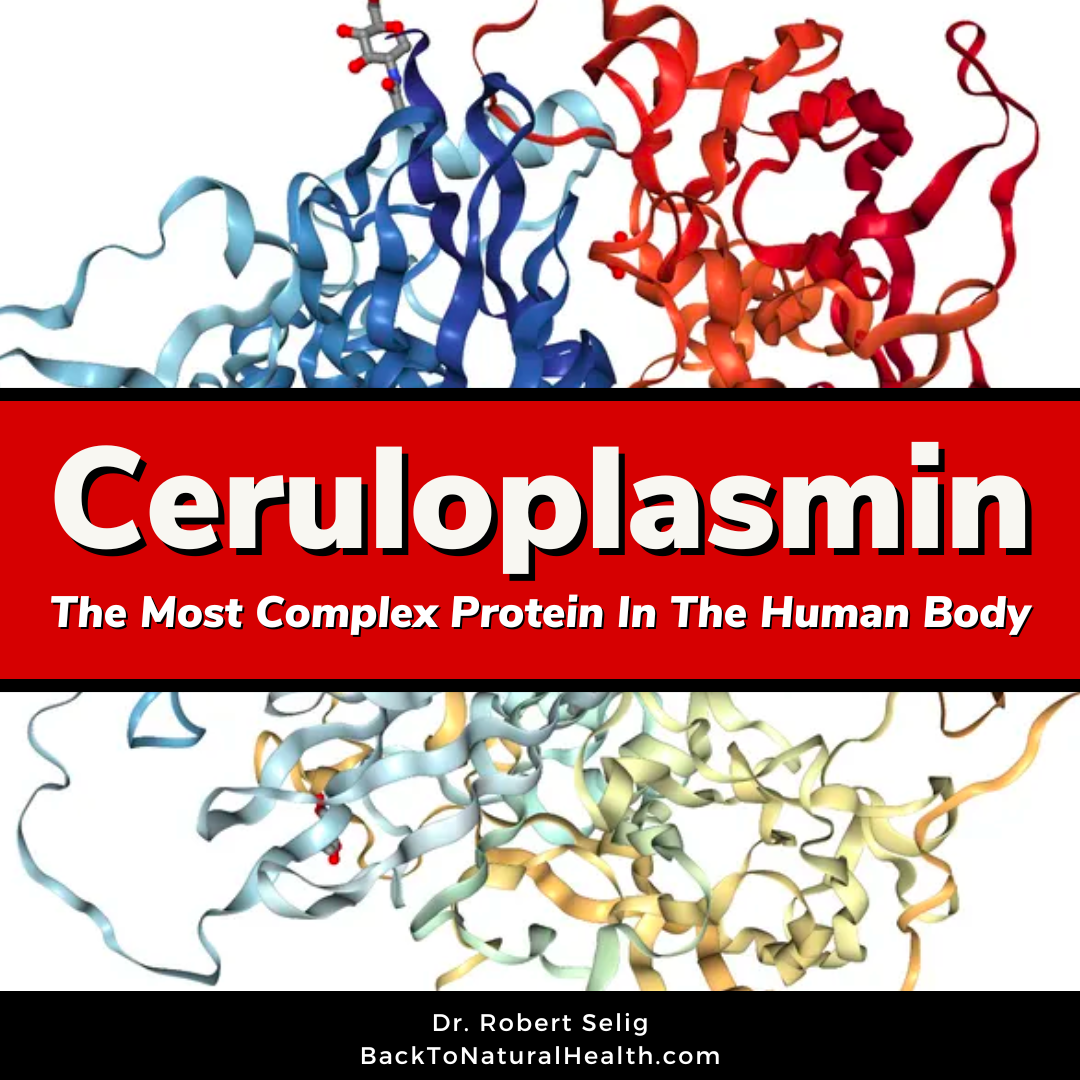Ceruloplasmin: The Most Complex Protein In The Human Body
Ceruloplasmin (Cp) is probably the most complex protein in the human body with 1046 amino acids with anywhere from 6-8 copper atoms that must be embedded in the right position for this protein to fold correctly so that it works.
Insulin has a measly 51 amino acids, and growth hormone has about 350 amino acids.
Ceruloplasmin may well be the most sophisticated enzyme in existence.
A defect or mutation in the ceruloplasmin gene/ATPB7 enzyme disables and inhibits copper ions to be incorporated into ceruloplasmin, a classic of Wilson's Disease.
ATP7B enzyme loads the copper ions to ceruloplasmin, but the critical point is that the ATP7B enzyme needs magnesium, copper, and retinol to do its job.
If those nutrients are not up to speed, ceruloplasmin synthesis in the liver can still be compromised even without a gene mutation.
Ceruloplasmin is the primary copper chaperone, performing its day job.
However, Cp is also an acute phase reactant.
Meaning Cp levels increase in cases of inflammation, infection, and trauma or in conditions such as the setting of various inflammatory processes, including hepatitis and infectious disease, blood diseases, diabetes, cardiovascular diseases, cancer, inflammation, and after surgery.
It may also be increased during pregnancy while taking birth control pills or any synthetic estrogens or steroids.
So, the take-home message is that ceruloplasmin is also an acute phase reactant, which accounts for its rise during numerous disorders and therefore limits the use of ceruloplasmin as a copper status marker, especially during illness.
That is why hair tissue mineral analysis (HTMA) is the gold standard for the status of copper when interpreted intelligently.
The entire cupro-enzyme system depends on Cp for copper to get to its destined job sites, whether in the brain to activate the DBH enzyme or PAM, or in the cytochrome four complex of the mitochondria in making ATP.
Also, the cross-linking of our connective tissues in the enzyme Lysyl oxidase or the other copper enzymes like tyrosinase, catalase, and Glutathione peroxidase are all ceruloplasmin-bound copper-dependent.
Cp also expresses as ferro-oxidase and controls iron in the human body.
The cupro-enzyme systems depend on ceruloplasmin bound copper, so the right form of non-toxic copper can be delivered to activate those copper enzyme systems.
That how important the status of copper is in human physiology, but if magnesium is deficient, then the ATPB7 gene will not load the copper into CP, compromising the delivery of copper.
ATP is worthless in the cell without magnesium.
It does nothing...until a magnesium atom is attached.
ATP-Mg is the true energy molecule of the cell.
When was the last time your biochemical textbooks or an allopathic doctor told anyone this?
Amazing, but true as our orthodox medicine is taught to categorize/diagnose and treat with procedures and almost always with drugs.
And guess what most of those drugs deplete?
*Magnesium*
Vitamin D metabolism is 100% dependent on magnesium at two places.
So the more Vitamin D you consume, the more you deplete magnesium.
Calcitonin and PTH are both magnesium-dependent as well.
Excess calcium blocks magnesium absorption as well as low stomach acid.
Remember that ATP7B enzyme that loads copper to ceruloplasmin?
It is magnesium-dependent as well, as is everything in the human body that requires Mg-ATP to function.
A better name would be Mg-ATP7B, but that would be medical heresy.
Copper in complex 4 of the Cytochrome C, which must be bound by ceruloplasmin to be delivered to complex 4, is the only element on Earth that can split oxygen to make water and ADP.
This process makes the production of ATP-Mg possible.
That is why copper is the last step in the electron chain to guarantee electrons' delivery from copper to oxygen.
Contact me for your hair tissue mineral analysis today to find out your mineral status.

